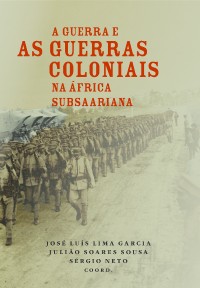Please use this identifier to cite or link to this item:
https://hdl.handle.net/10316.2/46801| Title: | Bosbefok and Koevoet: the border war in Namibia and Angola in South African soldiers’ memory | Authors: | Schliehe, Nils | Keywords: | War;Namibia;Angola;Apartheid;Guerra;Namíbia;Angola;Apartheid | Issue Date: | 2019 | Publisher: | Imprensa da Universidade de Coimbra | Journal: | http://hdl.handle.net/10316.2/46793 | Abstract: | «Bosbefok» and «Koevoet» are two words that are
widely known among the Afrikaans‑speaking
population of
South Africa. During the 23 years of conflict more than 300 000
young men served as conscripts in the South African Defence
Force. They were drafted right away from schools and universities
into a war they did not know anything about. Recently
some of those former soldiers have published their experiences and memories in a written form. These diaries and memoirs
offer a first‑hand
account to analyse how young drafted soldiers
experienced the conflict that is today remembered as one of the
«hot wars» of the Cold War Era. The four books that form the
basis for this research were published between 1998 and 2011
by mostly English speaking South Africans. My research identified
parallels between individual accounts that can be interpreted
as new aspects of a collective memory. Although the
military duty was not popular, it was part of the life of a white
South African, which could only be escaped by leaving the
country. During basic training the so called «Troepies» became
aware of the conflict between English and Afrikaans‑speaking
South Africans and when they were sent to the combat zone
they noticed the efficiency of the South African propaganda
machine that kept the war out of the South African public. The
service in the far away operational area was shaped by boredom,
consume of legal and illegal drugs and the strict censorship of
the army that turned the rare phone calls and letters from home
into «vital links» to the former civilian life. Some soldiers received
long‑term
mental disruptions that are today identified as Post
Traumatic Stress Disorder (PTSD). In South African slang they
became known as «bosbefok», or literally «bush crazy». Most of
the former Troepies claim they had no political opinion towards
the reasons of the war. They were just fighting it because they
were forced to do. Questions of guilt stay unanswered while
mistreatment and execution of prisoners and civilians are described
as everyday business at the frontline. War crimes and
acts of torture are however remembered not as committed by
the «common Tropie» but by special units of the South African
forces like the notorious special police unit «Koevoet». «Bosbefok» e «Koevoet» são duas palavras amplamente conhecidas nas províncias da África do Sul onde a maioria da população fala Afrikaans. Durante os 23 anos de conflito, mais de 300 000 jovens serviram na South African Defence Force. Estes foram recrutados nas escolas e nas universidades para uma guerra sobre a qual nada sabiam. Recentemente, alguns desses ex‑soldados passaram a escrito as suas experiências e as suas memórias. Esses diários oferecem um relato em primeira mão para analisar como os jovens soldados experimentaram um conflito que hoje é recordado como uma das Hot Wars da era da Guerra Fria. Os quatro livros que constituem a base para esta pesquisa foram publicados por sul‑africanos, em inglês, entre 1998 e 2011. A minha investigação permitiu identificar paralelismos entre os relatos individuais, que podem ser interpretados como novos aspetos de uma memória coletiva. Embora o serviço militar não fosse popular, fazia parte da vida de um sul‑africano branco, que só poderia escapar se deixasse o país. Durante a instrução básica, os chamados «Troepies » tomaram consciência do conflito entre os ingleses e os sul‑africanos que falavam Afrikaans e, quando foram enviados para as zonas de combate, anotaram a eficiência da máquina de propaganda sul‑africana que mantinha a guerra distante do grande público. O serviço efetivo nas distantes áreas operacionais era marcado pelo tédio, pelo consumo de drogas legais e ilegais e pela censura do exército, o que transformava os raros telefonemas e cartas recebidos em «elos vitais» com a antiga vida civil. Alguns soldados começaram a revelar sintomas que hoje são identificados como «Perturbação Pós‑Stress Traumático » (PPST). Na gíria sul‑africana estes tornaram‑se conhecidos como «Bosbefok» ou, literalmente, «loucos do mato». A maioria dos «Troepies» afirmam não ter opinião política sobre as razões da guerra. Afiançam que lutaram apenas porque foram forçados a fazê‑lo. Questões sobre sentimentos de culpa permanecem sem resposta, enquanto os maus‑tratos e as execuções de civis e de prisioneiros são descritos como fazendo parte da rotina diária na frente de combate. Os crimes de guerra e a tortura não são, no entanto, atribuídos à «Common Tropie», mas às unidades especiais das forças sul‑africanas, com destaque para unidade de polícia especial «Koevoet». |
URI: | https://hdl.handle.net/10316.2/46801 | ISBN: | 978-989-26-1632-2 (PDF) 978-989-26-1631-5 |
DOI: | 10.14195/978-989-26-1632-2_7 | Rights: | open access |
| Appears in Collections: | A Guerra e as Guerras Coloniais na África subsaariana |
Files in This Item:
| File | Description | Size | Format | |
|---|---|---|---|---|
| bosbefok_and_koevoet.pdf | 2.03 MB | Adobe PDF |  |
Items in DSpace are protected by copyright, with all rights reserved, unless otherwise indicated.
